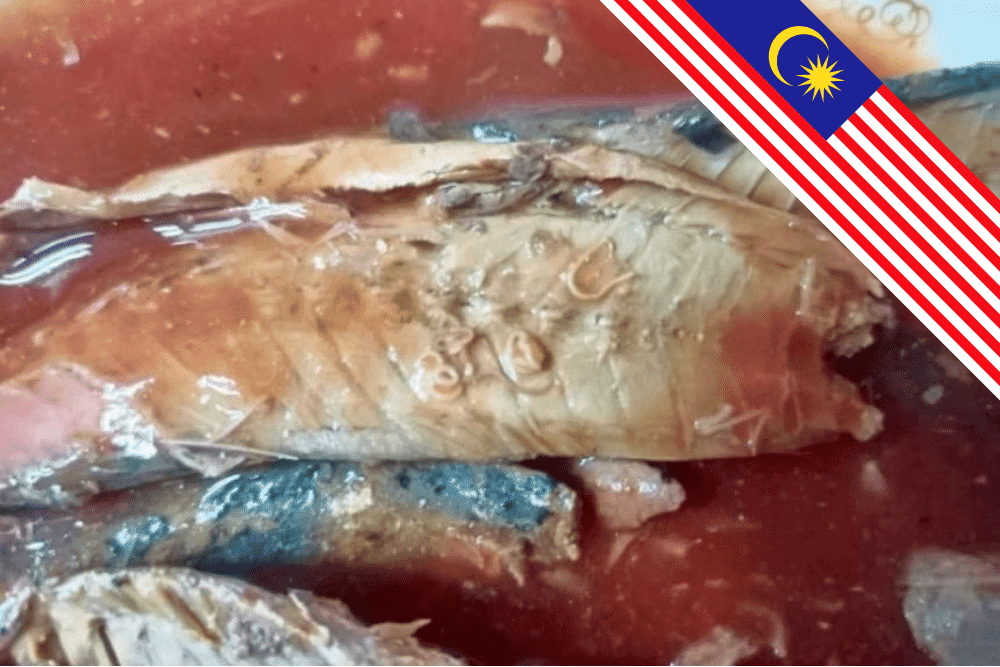Malaysian authorities seized over 16 tonnes of canned sardines imported from Singapore after discovering they were contaminated with parasitic worms.
The presence of Anisakis spp., a type of worm that can cause severe gastrointestinal symptoms, prompted the seizure. The affected sardines were imported from China via Singapore and lacked proper import permits.
Contaminated Shipment at BSI Checkpoint
On March 27, during a routine inspection at the Bangunan Sultan Iskandar (BSI) checkpoint in Johor Bahru, Malaysian Quarantine and Inspection Services (Maqis) officers seized a consignment of canned sardines imported from Singapore.
Authorities flagged the lorry carrying the sardines for inspection after it failed to present the necessary import permits. Upon closer examination, officials found signs of contamination and sent samples to the Chemistry Department for further testing. This confirmed the presence of Anisakis spp., a type of parasitic worm.
Anisakis Worms in Malaysia’s Canned Sardines
Anisakis worms, like those discovered in Malaysia’s canned sardines, infect marine animals such as fish and squids. When humans consume improperly cooked infected fish or seafood, these worms can cause anisakiasis. This results in symptoms like nausea, severe abdominal pain, vomiting, and diarrhoea.
Though initially invisible to the naked eye, these parasitic worms can grow large enough to be visible in processed fish. Failure to effectively contain and eliminate these worms from the food supply chain can trigger widespread public health concerns in Malaysia. The presence of these worms indicates potential lapses in inspecting and enforcing rigorous food safety procedures during the production process.
Climate change and the growing population of marine mammals, which host these parasites, have contributed to a global increase in anisakis infections. Therefore, the detection and seizure of contaminated shipments by Malaysian authorities help ensure the safety and well-being of the public.
Legal Measures Against Contaminated Shipments in Malaysia
The detection of parasitic worms in Malaysia’s canned sardines triggered immediate action from Maqis. Under Section 14(a) of the Malaysian Quarantine and Inspection Services Act 2011 [Act 728], importing goods containing pests, diseases, or contaminants is strictly prohibited. The seizure of over 16 tonnes of canned sardines at the BSI checkpoint illustrates the strict enforcement of these regulations in Malaysia.
The consequences of violating this law are severe. Offenders could face fines of up to RM100,000, a jail term of up to six years, or both. This strict legal framework aims to ensure that Malaysia’s food imports adhere to safety standards. Doing so safeguards consumers from potential health risks linked to contaminated food products.
The quick response from Maqis in seizing the shipment of sardines demonstrates the agency’s commitment to maintaining high food safety standards and preventing the spread of parasitic worms in Malaysia’s canned sardines.
Preventive Measures and Public Health Awareness
Malaysian authorities are actively enforcing strict import regulations and conducting thorough inspections at entry points to prevent future occurrences of discovering parasitic worms in canned sardines.
It’s crucial to raise public awareness about food safety and the potential health risks associated with contaminated products. Consumers should be vigilant when purchasing canned sardines and other seafood products, looking for signs of contamination like damaged packaging or unusual odours. If anything appears suspicious, they should report it to the relevant authorities immediately. Additionally, cooking seafood thoroughly can help reduce the risk of infection from parasites like Anisakis spp. These parasites are often present in raw or undercooked fish.
Public awareness campaigns and educational initiatives can also play a key role in reducing risks. By informing the public about the dangers of Malaysia’s parasitic worms in canned sardines and other seafood products, authorities can help prevent health issues and promote safer food handling practices.
Image credit: Johor Maqis

